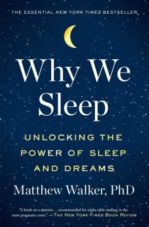
"I'll sleep when I'm dead" is an old saying, bolstered by Margaret Thatcher who said, "I sleep about 4 to 5 hours a day and that's enough", unfortunately for her, that belief is plain wrong! Her fate proved it: Alzheimer, then a slow and painful death. Most people don't wish to have a parent or relative in that state, neither do I.
What is more disquieting about this belief is that it is not only held by her, but by a myriad of societies. If you are in a haste to die or do believe that God/mother nature was foolish to dedicate 33% of your life to sleep, please don't read what follows.
Back to people who love their lives, sleep-deprivation has been declared a global epidemic by the World Health Organisation, with its main consequence being shortening of lifespan and eventually death.
What is sleep to begin with? Why does lack of sleep cause death? Why do teens sleep late? Why do we forget more as we age? All these questions have answers, scientific answers.
Let's warm up by deciphering this sleep phenomenon.
Every human being—superman and you included—has an internal clock of about 24hrs 15minutes. This natural clock is called the circadian rhythm and has a couple of components, all found in the brain, which make it function. The suprachiasmatic nucleus being the main one, accompanied by the thalamus.
When you are awake, adenosine, a sleep-inducing hormone, is being released. This hormone is constantly being released as long as you're awake. As such, it accumulates. This accumulation increases your sleep pressure or urge to sleep. Finally, when the sun sets and it is dark, the eye's retina does not detect light anymore. Associated to the sunset is a drop in temperature, monitored by the thermoreceptors in the hypothalamus. This set of biological conditions (no light, decrease in core body temperature), is the proviso for your suprachiasmatic nucleus to release melatonin. Melatonin, also known as the sleep hormone, causes the thalamus (sense receptor), to shut off your senses, thereby bringing about sleep.
A full night of sleep has 5 cycles of about 1h30mins each. This consists of a nuance between REM phases (light phase:phase in which we dream), and NREM phases(deep sleep), where the latter means Non Rapid Eye Movement - you can guess the former. The 1st 4 hours are dominated by the NREM (deep sleep) phase and the last 4hours by the REM phase. However, in babies and adolescents, the REM phase is more pronounced (significantly in babies). As keen breast-feeding mothers can observe, babies' eyeballs glide from left to right quickly when they fall asleep. While, the NREM phase is more significant in infants.
Despite all the benefits of this natural sleep pattern, 60% of adults consider this pattern as utopic and not realistic for their life situation. Perhaps most of these adults are unbeknownst to the consequences of the deviations from this sleep pattern.
Let's consider the benefits of sleep:
- Recycled and effective immune system
- Long-term memory consolidation. Both of the above done by the NREM phase. Sorry for old adults who receive pretty less of this sleep, reason why they forget much. More into that later.
- Memory association, logical reasoning and creativity done by REM sleep. This is why people think they have revelations when they dream; Thomas Edison knew this too well, he developed an original way of exploiting that; that's also why in swahili, a Kenyan proverb says: kulala juu ya tatizo (meaning sleep on that task), because when you sleep, then have REM-sleep and dream, your creativity and reasoning is increased by 30% as compared to when you are awake!
- Equally, emotions are stripped from memories during REM sleep. No wonder someone can rethink about her mum's death and not cry, whereas people with PTSD (Post-traumatic stress disorder) - who do not sleep - relive experiences with as much emotions attached to the thoughts as during the actual event.
Taking a look at the hell people are living while seemingly not being aware (Consequences of Sleep-Deprivation).
The word catastrophic will be euphemistic to describe the consequences.
Sleep only 4 hours for a night and your efficiency drops by 40% the following days (with concentration/focus being the most profoundly affected).
Sleeping just between 4-6hours everyday for a week, leads to a 50% decrease in the immune system's effectiveness.
Don't have enough NREM sleep and your memory will be afflicted. This is why cancer, alzheimer, insomnia, and cataplexy are great friends of sleep deprivation.
Not to mention all-nighters would be like citing great footballers and omitting Maradona. This is worse than all the previous ones, it inflicts you with a 70% drop in efficiency. To epitomize this point, consider narcolepsy, a sleep disorder that does not permit you to sleep at all - this is because it thwarts the release of melatonin and damages your thalamus. After being diagnosed as narcoleptic, patients hardly live up to 2 more years. Which makes it clear: when you don't sleep, you die!
Most of these effects linked to sleep-deprivation have one superpower; just like the greek-god of Hell, Hades, they are invisible to the victims.
As clear as it is from the data above, the relationship between sleep-deprivation and its consequences is not linear but exponential.
A moderate translation of these effects into real life situations is akin to this:
Being very irritable.
The amygdala (organ responsible for feelings), becomes hyperactive. As a result, you become an annoying partner, boss and parent, since almost everything vexes you.
Academically and professionally, results are plummeting.
You have a C-grade in a test you would have normally aced with an A - I don't know how you feel about that, but that's horrible to me.
You forget the PTA meeting appointment. No, it is not because you were too busy. It is probably because you did not sleep properly the days prior to the meeting.
Drowsy driving accidents (which is greater than alcohol and drugs related accidents combined, and rivals with cancer in the US!).
At times it is not because the driver reacted too late due to lack of concentration, but that he/she couldn't react at all. This is due to microsleeps - sleep lasting from a few to several seconds - which sleep-deprived drivers are victims of. During those microsleeps, there is muscle atonia (no muscular movement permitted). This state is supposed to be a gift, responsible for immobility during dreaming though some still kick others in bed. Stat: one person dies due to drowsy driving every hour in the US - that person could be your daughter or sibling.
Slow learning: You're deprived of memory consolidation (NREM sleep), memory association, creativity and motor skill enhancement (REM sleep), what did you expect?

A net decrease in physical perfomance and eventually sex appeal — yes and this too.
Addictions to drugs like caffeine. Oh did you not know?
You can read about the causes and solutions to sleep deprivation in our other articles.
Some causes of sleep deprivation include: Caffeine, Alcohol, Society, amongst others.
Sleep is not like money; there is nothing like taking a sleep debt during the week and returning it during the week-end. That's simply not how it works!
Works cited
Walker, Mathew. Why We Sleep: Unlocking the Powers of Sleep and Dreams. Penguin Random House, 2017.

Definition of Certain Terms (like a Mini Glossary)
- Suprachiasmatic nucleus:
- a less than a bean-size organ, with some hundred thousand neurons, found in the central region of the brain.
- Microsleeps:
- sleep lasting from few to several seconds.
- Thalamus:
- sense receptor organ, situated beside the suprachiasmatic nucleus.
- Amygdala:
- organ responsible for feelings, found at the left and right side of the brain.
- Hippocampus:
- organ where short-term memories are stored. It is also responsible for the consolidation of long-term memory.
- Muscle atonia:
- muscular immobility, which normally occurs when we are in the dreaming state.
- Cataplexy:
- a health condition where patients usually have muscle atonia as if they were in the dreaming state, despite being awake and very conscious.